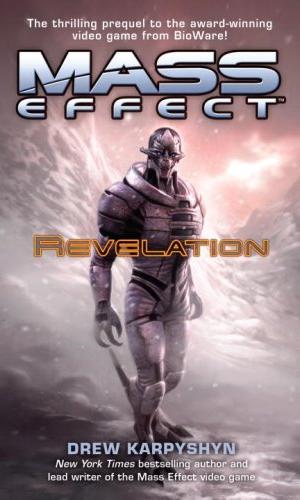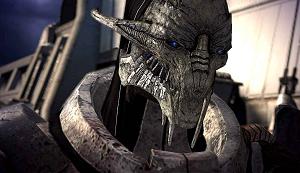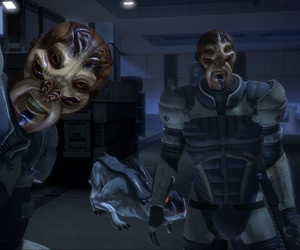Book Review: Mass Effect: Revelation
 | | Mass Effect: Revelation |
Considering how opinionated I get when it comes to adaptations—either from video game to movie, from movie to video game, from book to movie, from movie to television show, from television show to book, etc.—it’s amazing that I have yet to actually read a novel adapted from a video game. Granted, it seems like a bad idea to begin with, and it’s easy to assume that such an exercise would be pulpy, poorly written, and shallow.
Still, my love for the recent Mass Effect—a multiple award-winning game known for its intensely deep storyline and mythology—has finally pushed me into a new world. But has Mass Effect: Revelation, my first experience in the video-game-to-novel market, been worth it? Am I going to rush out and read the newer installment, Mass Effect: Ascension, and expand my reader repertoire to include this fanboy-dominated niche? More importantly, can this book stand on its own as a good piece of fiction? Can this book be enjoyed by people who don’t even like video games?
The story of Mass Effect: Revelation takes place several years prior to the events of the video game and attempts to fill in much of the backstory. For those unfamiliar with the game, this is about a hundred and fifty years in the future. Mankind has recently uncovered enigmatic alien technology in the solar system that allows for faster-than-light travel. Using devices known as mass relays, people began to colonize the stars only to discover in a tragic confrontation that they weren’t alone. Soon after a brief war of introduction known as the First Contact War, humanity was cautiously welcomed into a galactic society of alien races governed by the Citadel Council. Within a decade, humanity becomes a major force in galactic affairs, though they are still politely maligned and treated as children by the galaxy at large.
After a short prologue that takes place during the outbreak of the First Contact War, the novel follows Staff Lieutenant David Anderson of humanity’s Alliance Military—known to players of the video game as Captain Anderson—as he goes to investigate a distress call from a small science outpost on the remote planet Sidon. From there, he becomes involved in a complex series of events surrounding illegal research that was done at the station, a lone survivor who could be either whistleblower or architect of a massacre, a retired war hero, political intrigue, and an alien artifact shouded in mystery. Along the way, Anderson comes in contact with Saren, an agent of the Citadel Council who does not need to answer to the law and who will eventually become the primary antagonist of the video game.
 | | On the left: Anderson as he appears in the game; on the right: Keith David, the awesome actor who voices him |
The story is full of science-fiction pulp, aliens, conceits, and crazy technologies, but at its heart, the novel reads like a mystery thriller. The complexities of the universe are handled quickly and easily, meaning that you do not have to be familiar with that universe to enjoy the story, and everything unfolds in a dramatic way that never feels inaccessible. In other words, if you like mystery thrillers in sci-fi settings, you will probably like Mass Effect: Revelation, even if you’ve never picked up a video game controller.
Additionally, the main plot of the story is complex and full of genuine surprises. There are a few minor twists and turns, and the underlying intrigue is sufficiently layered to justify the mystery. Information is handled extremely well, and not once did I ever question how a character could have known or done something not explicitly explained in the story.
Having said that, I will admit that the characters are a bit flat. Some are surely interesting and fun—especially the krogan bounty hunter Skarr—but few have unique voices or lasting emotional weight. The inevitable romantic subplot thrown into the story feels forced and uninteresting, and the dialogue is tainted with occasional cheese and cliché. Additionally, the characters—even the aliens—all seem to think along the same lines and in similar ways. While I can appreciate the irony of this in the face of how often the different species prejudge one another, it doesn’t add much flavor to the story. Luckily, the main character, Lieutenant Anderson, is given plenty of reason and motivation on multiple psychological levels, so despite weak character development throughout the plot, at least the plot is reasonably driven by character.
 | | Saren: sociopathic alien skullhead |
My most specific character complaint involves Saren. ***SPOILER WARNING (for both novel and video game)!*** In the video game, I always had a hard time accepting that an evil bastard like Saren would be treated with such reverence by the Citadel Council. A possible explanation exists in the story with the introduction of Sovereign’s indoctrination (which could allow for Saren to have become as evil as necessary before you ever met him in the video game), but as you learn when you discuss Saren’s past with Captain Anderson in the game—and as you see in this novel—Saren has never had a decent or redeeming quality about him; he is ludicrously evil before he even hears of Sovereign. He is a bonafide sociopath, and while many of his scenes in the novel are darkly entertaining and well-written, how this one-dimensional character got to be in a position of power is nonsensical. Even the pathetic explanation offered late in the story—that he lost a brother in the war—isn’t enough to explain his complete lack of empathy. ***END SPOILER WARNING!*** Still, it’s a nitpick, and doesn’t interfere too greatly with my overall opinion of the novel or game.
However, where the characters falter, the action succeeds. Drew Karpyshyn, the writer of this novel (and also the head writer of the video game), is competent but somewhat generic in his overall literary style, but he is a master of writing action scenes. It’s incredibly easy for a writer to explain too much about what is happening during an action beat, which quickly turns an exciting scene into a boring an uninteresting one. It’s equally as easy to gloss over too many details, which turns the action into a cacophony of words that never add up to any meaning for the reader. Karpyshyn walks the line between these two as if it were the simplest thing in the world, and his action scenes are a delightful surprise in what is otherwise a pretty standard writing exercise. He handles all the details and complexities of the moment without making his scenes sterile or unintelligible, and that deserves recognition in a novel that relies so heavily on its plethora of action.
So in the end, though the story is ultimately not very deep, it is entertaining and engaging. There are underlying themes that can be read into it, but it would be tough to convince me that they were wholly intentional. There are shades of the modern state of mind, especially where the politics come into play, and while I think these aspects are treated well, they never give the narrative more than a beat or two of actual meaning.
 | | Who says it's no fun to have four eyes? |
These beats are welcome and unexpected, though, considering that this is a novel based on a video game. Despite its flaws and shallowness, Mass Effect: Revelation has certainly convinced me that there is benefit to be found in adapting a video game into a novel, easily more than there is in adapting one into a movie. It did exceed my expectations, which were admittedly pretty low, but it’s important to note that this is a better novel than some of the original works out there. Karpyshyn treats his story and his universe with the utmost reverence, and his love and respect for the material is transferred to the reader, even if the reader has never played the game.
Of course, if you have played the game, there are plenty of nods for you. A smattering of sentences thrown in might seem pointless to a casual reader, but they have a wealth of meaning for people who know where the story is going after the final page. However, you might get a little bored with the explanations of the various alien races, the Citadel Council, and other minutia necessary to set up the story. Luckily, these parts are brief—getting the information to the uninformed reader as efficiently as possible—but it begs the question: how many people who haven’t played the game are actually going to read this book? I can’t imagine the number being much higher than zero, despite my surely influential recommendation here. The novel was released a few months before the game, so for many dedicated fans this might have been their introduction to the Mass Effect universe, but I can’t use that as a criteria for recommending it now, as we are approaching the one year anniversary of the game’s release. If you’re a gamer interested in Mass Effect, I definitely recommend the video game before I recommend this novel.
Getting back to where I started, though, do I regret breaking my literary cherry when it comes to adaptations like this one? Not at all. And yes, I will be racing out to get the second book soon, which purportedly sets up the upcoming sequel to the video game. Also, I might just look into reading those ever-popular Halo books if I find myself in just the right mood.
FINAL SCORE:





It's a surprisingly good read with excellently handled action and mystery, but shallowness and weak character development prevent it from being much more than pulp fiction.
|
-e. magill, 10/06/2008
|
|